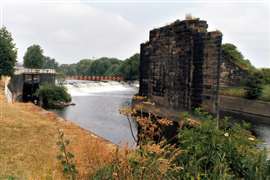UK construction company hit with huge fine after worker’s death
13 June 2024
UK-based construction contractor BAM Nuttall has been ordered to pay a fine of nearly £2.4 million (US$3.1 million) after the death of a worker in 2017.
 Knostrop weir on the River Aire, England (Image: Dr Neil Clifton via Wikimedia Commons)
Knostrop weir on the River Aire, England (Image: Dr Neil Clifton via Wikimedia Commons)
Gary Webster died two days after drowning in the River Aire in Yorkshire, England, on 30 October 2017.
He and another worker had been on a boat removing debris from the bottom of the weir gates at Knostrop Weir.
They had been working for BAM Nuttall as part of the £23 million Leeds Flood Defence scheme, which BAM Nuttall had won in joint venture. The scheme involved replacing the fixed weirs at both Crown Point and Knostrop with moveable weirs that can be lowered in flood conditions to reduce river levels.
Webster and his colleague’s boat capsized after being pulled into turbulent water caused by the “considerable flow of water flowing over the top of the weir”, according to the Health and Safety Executive (HSE).
Webster, 60, was repeatedly pulled under the water and was eventually recovered by a diver 14 minutes later. He was pronounced dead on 1 November 2017 at Leeds General Infirmary. The other worker managed to swim to safety.
A Health and Safety Executive (HSE) investigation found BAM Nuttall had several operatives who were trained and authorised to control the weir gates so that the flow of the water could be slowed down. This would have allowed the debris to float away or be reached safely by boat. However, the company failed to carry out this task.
BAM Nuttall Limited, of Knoll Road, Camberley, Surrey, pleaded guilty to breaching Section 2(1) of the Health and Safety at Work etc. Act 1974. The company was fined £2.345 million and ordered to pay £25,770.48 in costs at Leeds Magistrates’ Court on 12 June 2024.
HSE inspector Jayne Towey said: “BAM Nuttall Ltd failed to plan the work. It failed to carry out any assessment of the risks involved with the task. It failed to have any regard to the recognised hierarchy of controls to reduce the risk associated with removing debris from the water. It failed to ensure that suitable safety measures were in place and failed to put in place a safe system of work.
“This incident could so easily have been avoided by simply carrying out correct control measures and safe working practices.”




